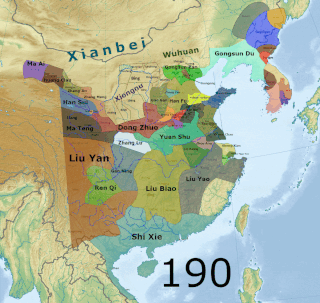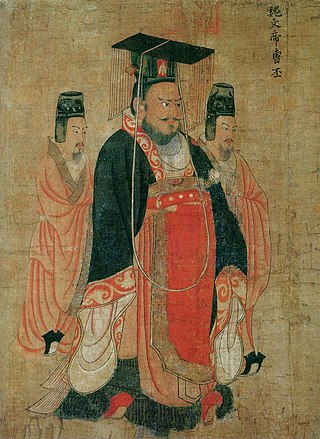Related Research Articles

The Three Kingdoms of Cao Wei, Shu Han, and Eastern Wu dominated China from 220 to 280 AD following the end of the Han dynasty. This period was preceded by the Eastern Han dynasty and followed by the Western Jin dynasty. Academically, the periodisation begins with the establishment of Cao Wei in 220 and ends with the conquest of Wu by Jin in 280. The period immediately preceding the Three Kingdoms, from 184 to 220, was marked by chaotic infighting among warlords across China as Han authority collapsed. The period from 220 to 263 was marked by a comparatively stable arrangement between Cao Wei, Shu Han, and Eastern Wu. This stability broke down with the conquest of Shu by Wei in 263, followed by the usurpation of Cao Wei by Jin in 266 and ultimately the conquest of Wu by Jin in 280.

Sun Quan, courtesy name Zhongmou (仲謀), posthumously known as Emperor Da of Wu, was the founder of Eastern Wu, one of the Three Kingdoms of China. He inherited control of the warlord regime established by his elder brother, Sun Ce, in 200. He declared formal independence and ruled from November 222 to May 229 as the King of Wu and from May 229 to May 252 as the Emperor of Wu. Unlike his rivals Cao Cao and Liu Bei, Sun Quan was much younger and governed his state mostly separate of politics and ideology. He is sometimes portrayed as neutral considering he adopted a flexible foreign policy between his two rivals with the goal of pursuing the greatest interests for the country.

Cao Pi, courtesy name Zihuan, was the first emperor of the state of Cao Wei in the Three Kingdoms period of China. He was the second son of Cao Cao, a warlord who lived in the late Eastern Han dynasty, but the eldest son among all the children born to Cao Cao by his concubine, Lady Bian. According to some historical records, he was often in the presence of court officials in order to gain their support. He was mostly in charge of defence at the start of his career. After the defeat of Cao Cao's rival Yuan Shao at the Battle of Guandu, he took Yuan Xi's wife, Lady Zhen, as a concubine, but in 221 Lady Zhen died and Guo Nüwang became empress.

Wu, known in historiography as Eastern Wu or Sun Wu, was a dynastic state of China and one of the three major states that competed for supremacy over China in the Three Kingdoms period. It previously existed from 220 to 222 as a vassal kingdom nominally under Cao Wei, its rival state, but declared complete independence in November 222. It was elevated to an empire in May 229 after its founding ruler, Sun Quan, declared himself emperor.

Zhou Tai, courtesy name Youping, was a military general serving under the warlord Sun Quan during the late Eastern Han dynasty and early Three Kingdoms period of China. He previously served under Sun Ce, Sun Quan's elder brother and predecessor.
Xu Sheng, courtesy name Wenxiang, was a military general serving under the warlord Sun Quan in the late Eastern Han dynasty and early Three Kingdoms period of China.

Cao Ren, courtesy name Zixiao, was a military general serving during the late Eastern Han dynasty of China under the warlord Cao Cao, who was also his older second cousin. He continued serving in the state of Cao Wei – founded by Cao Cao's son and successor, Cao Pi – during the Three Kingdoms period. He played a significant part in assisting Cao Cao in the civil wars leading to the end of the Han dynasty. He was appointed as the Grand Marshal (大司馬) when Cao Pi ascended the throne, and was also credited by the latter for the establishment of Wei. However, Cao Ren was also once derided as a mediocre commander by Zhu Huan, a general from Wei's rival state Eastern Wu.

The military history of the Three Kingdoms period encompasses roughly a century's worth of prolonged warfare and disorder in Chinese history. After the assassination of General-in-chief He Jin in September 189, the administrative structures of the Han government became increasingly irrelevant. By the time of death of Cao Cao, the most successful warlord of North China, in 220, the Han empire was divided between the three rival states of Cao Wei, Shu Han and Eastern Wu. Due to the ensuing turmoil, the competing powers of the Three Kingdoms era found no shortage of willing recruits for their armies, although press-ganging as well as forcible enlistment of prisoners from defeated armies still occurred. Following four centuries of rule under the Han dynasty, the Three Kingdoms brought about a new era of conflict in China that shifted institutions in favor of a more permanent and selective system of military recruitment. This ultimately included the creation of a hereditary military class as well as increasing reliance on non-Chinese cavalry forces and the end of universal conscription.
Jiang Qin, courtesy name Gongyi, was a military general and naval specialist serving under the warlord Sun Quan during the late Eastern Han dynasty of China. He previously served under Sun Quan's elder brother and predecessor, Sun Ce, and participated in various battles throughout his service under the Sun family, including Sun Ce's conquests in Jiangdong, the Battle of Xiaoyao Ford and Lü Meng's invasion of Jing Province, twice holding joint command of the Sun armies.
Zang Ba, courtesy name Xuangao, was a military general who lived during the late Eastern Han dynasty and Three Kingdoms period of China. He served the warlord Tao Qian initially, followed by Lü Bu and finally Cao Cao and his successors, but for the most part of his career, he remained semi-autonomous over his troops and eastern China. The years of his birth and death are not recorded, but he served the state of Cao Wei in the Three Kingdoms period until the reign of the second Wei emperor, Cao Rui.
Wen Ping, courtesy name Zhongye, was a military general who lived during the late Eastern Han dynasty and Three Kingdoms period of China. During his tenure as a general under the warlord Cao Cao, he was credited with defeating the enemy general Guan Yu and defending Cao Cao's interests in Jiangxia Commandery from the eastern warlord Sun Quan.

Zhu Ran, born Shi Ran, courtesy name Yifeng, was a Chinese military general of the state of Eastern Wu during the Three Kingdoms period of China. Despite being a childhood friend of Wu's founding emperor, Sun Quan, he was never given an important position or assignment before Lü Meng's invasion of southern Jing Province in 219, wherein he assisted in capturing the enemy commander, Guan Yu. Following the Battle of Xiaoting, Wu's rival state, Cao Wei, launched a three-pronged strike on Wu's northwestern, middle, and eastern borders. Zhu Ran was sent to the northwestern border, where he defended the city of Jiangling with only 5,000 troops against an enemy force about ten times greater. He rose to fame and became feared throughout Wei. He then participated in a series of military operations against Wei, during which he defeated several enemy units, but the overall objectives were never met. Before his death, Zhu Ran was granted authority to oversee matters within the army.
Sun Lang was a son of the Chinese warlord Sun Jian, who lived during the late Eastern Han dynasty. He was a half-brother of Sun Quan, the founding emperor of the state of Eastern Wu in the Three Kingdoms period.
Pan Zhang, courtesy name Wengui, was a military general serving under the warlord Sun Quan during the late Eastern Han dynasty of China. He continued serving in the state of Eastern Wu during the Three Kingdoms period until his death. Pan Zhang was praised by Chen Shou as one of the "twelve tiger minister of Jiangdong" (江東十二虎臣).

Wang Shuang, courtesy name Ziquan, was a military officer of the state of Cao Wei during the Three Kingdoms period of China. He initially participated in battles against Wei's rival state Eastern Wu but was defeated and captured. Later, he rejoined Wei and was reassigned to the western front to fight against Wei's other rival state, Shu Han. He was killed in battle against Shu forces.
Zhu Huan (177–238), courtesy name Xiumu, was a military general of the state of Eastern Wu during the Three Kingdoms period of China. Although he started his career early under the warlord Sun Quan, he did not receive any important responsibilities until after the Battle of Jiangling in 209. Since then, Zhu Huan had taken charge of some local defences and successfully quelled a few rebellions. Between 222 and 225, when Cao Pi, the emperor of Wu's rival state Wei, launched a three-pronged invasion of Wu, Sun Quan appointed Zhu Huan as a military commander to resist the Wei invaders. Zhu Huan defeated the Wei general Cao Ren at the Battle of Ruxu (222–223).
The Battle of Dongkou was a naval battle fought between October 222 and January 223 between forces of the state of Cao Wei and the Kingdom of Wu during the Three Kingdoms period of China. The battle concluded in a Wu victory.

During the Three Kingdoms period of Chinese history, Cao Pi, the first emperor of the state of Cao Wei, invaded the rival state of Eastern Wu thrice during his reign between 222 and 225. The casus belli for the attack was the Wu leader Sun Quan's refusal to send his son Sun Deng as a hostage to the Wei court, under which Wu was a nominal vassal at the time. The invasions were separated into two parts. The first attack occurred in the years 222–224 before Cao Pi ordered total retreat. The second and last part was fought in 225.
The Battle of Jiangling was fought between the forces of the Cao Wei and Eastern Wu dynasties in the early Three Kingdoms period of China. The battle, which took place around present-day Jiangling County, Hubei, was an integral part of the Wei emperor Cao Pi's three-pronged campaign against the Wu leader Sun Quan. It spanned a period of about six months from October 222 to April 223. Of the three fronts, the most critical Wei attacks were concentrated against the Wu fortress at Jiangling.
The Incident at Guangling was a military confrontation that took place from late 224 to early 225 between the state of Cao Wei and the kingdom of Wu during the Three Kingdoms period of China. Although the conflict was considered a naval battle, no fighting officially occurred.
References
- ↑ Generals of the South. " Further upstream, at Ruxu, the defence was under the command of Zhu Huan."
- ↑ De Crespigny, Rafe. "Online Publications" (PDF). Asian Studies. Archived from the original (PDF) on 8 June 2011. Retrieved 9 April 2012.
This, of course, meant war, and war came very quickly. In the ninth month, Cao Pi gave orders for three armies to move south against the Yangzi.
- ↑ de Crespigny, Rafe (2007). A biographical dictionary of Later Han to the Three Kingdoms (23–220 AD). Brill. p. 46. ISBN 978-90-04-15605-0.
- Chen Shou. Records of the Three Kingdoms (Sanguozhi).
- Rafe de Crespigny. Generals of the South, Chapter Seven: Claim to the Mandate 222-229.
- Rafe de Crespigny. (2007). A biographical dictionary of Later Han to the Three Kingdoms (23–220 AD).
31°38′7.22″N117°53′20.29″E / 31.6353389°N 117.8889694°E